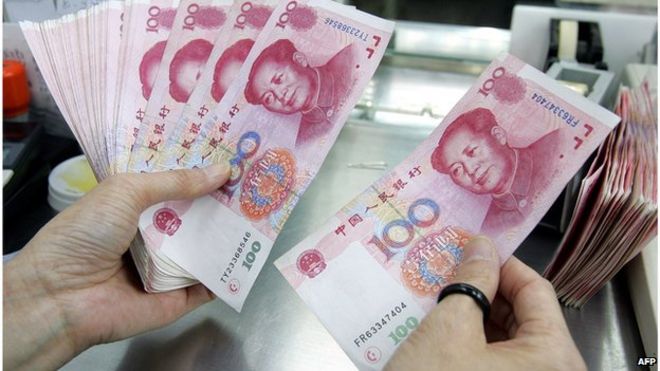China devalued its currency on Tuesday, a move that left it with its biggest one day fall in more than 20 years.
It fell again today – a move some are interpreting as a second devaluation.
However, the system China has put in place means the yuan could, in theory, keep on devaluing.
As long as it decides it wants it to.
For the first time the central bank is allowing the market to play a part in setting the exchange rate.
The central bank, the People’s Bank of China, said in a statement: “Since China’s trade in goods continues to post relatively large surpluses, the yuan’s real effective exchange rate is still relatively strong versus various global currencies, and is deviating from market expectations.
“Therefore, it is necessary to further improve the yuan’s midpoint pricing to meet the needs of the market.”
Before Monday the official rate for the yuan or renmnbi was arbitrarily fixed each day by the bank.
Central Bank
Since then bank has said it will still fix the rate, but will base it on the level it reached in the market on the previous day.
So in theory the market will dictate the rate at which the yuan is traded at at the beginning of each day.
The devaluations of the last two days have therefore been in response to the downward pressure of the market on the currency, with Wednesday’s opening rate reflecting Tuesday’s close.
However, in reality the central bank will intervene in the market to keep some control over the exchange rate.
On Wednesday the yuan fell almost 2% during the day as investors aggressively sold it off.
But it was then yanked back by the central bank buying equally aggressively just before the close. So the new trading level on Thursday will be only 0.8% lower than the start of the previous day’s trade.
Liberalisation
Jonathan Fenby, managing director of the China team at Trusted Sources believes that the central bank really is moving towards liberalisation.
He said: “What you’ve done is gone to market fixing for the currency. It’s still controlled. There’s still a 2% band either side of the fixing. But this is a move towards market liberalisation.”
He says that there is a genuine desire among the reformers in the government to liberalise the exchange rate as well as to stimulate the economy through a devaluation.
He said: “The reformer in China, the modernisers want the economy, everything, including the currency to be much more affected by, and set by, market forces rather than by the authorisation of a one party state.”
Source: 































